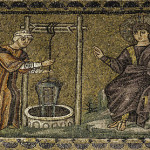We run our website the way we wished the whole internet worked: we provide high quality original content with no ads. We are funded solely by your direct support. Please consider supporting this project.

Hungry Hearts
Every human being with normal mental and emotional faculties longs for more. People typically associate their longing for more with a desire to somehow improve their lot in life—to get a better job, a nicer house, a more loving spouse, become famous, and so on. If only this, that, or some other thing were different, we say to ourselves, then we’d feel complete and happy.
The best word in any language that captures this hunger for more, according to C. S. Lewis, is the German word Sehnsucht (pronounced “zane-zookt”). It’s an unusual word that is hard to translate, for it expresses a deep longing or craving for something that you can’t quite identify and that always feels just out of reach. Some have described Sehnsucht as a vague and bittersweet nostalgia and/or longing for a distant country, but one that cannot be found on earth. Others have described it as a quasi-mystical sense that we are incomplete, combined with an unattainable yearning for whatever it is that would complete it.
Lewis saw Sehnsucht as reflective of our “pilgrim status.” It indicates that we are not where we were meant to be, where we are destined to be; we are not home. Lewis once wrote to a friend that “our best havings are wantings,” for our “wantings” are reminders that humans are meant for a different and better state. In another place he wrote:
“Our lifelong nostalgia, our longing to be reunited with something in the universe from which we feel cut off, to be on the inside of some door which we have always seen from the outside is … the truest index of our real situation.”
I’ve come to the conclusion that the most important aspect of this Sehnsucht is a need to experience God’s perfect, unconditional love. A central aspect of what this means is that we long to know, in an experiential way, that we have unlimited or unsurpassable worth to God and that we are absolutely secure in this love and worth.
The degree to which we feel anything approximating this unconditional love, unsurpassable worth, and absolute security is the degree to which we feel fully alive and at home in the world. To the degree we don’t experience this, however, we remain hungry, out of place, and less than fully alive.
Sehnsucht is hunger for life.
We are made to perpetually share in a life in which we are perfectly and unconditionally loved, in which we experientially know we could not matter more to God than we already do, and in which we feel absolutely secure in this love and worth, for we know that nothing—including the loss of our biological life—could cause us to lose this life.
This hunger for life is the most fundamental driving force for our lives.
—Adapted from Benefit of the Doubt, pages 56-58
Image by Jordan McQueen.
Category: General
Tags: C.S. Lewis, Love, Spiritual Hunger
Related Reading

Hearing and Responding to God: Part 5
We hope you’ve enjoyed this series on hearing and responding to God. In this last video on the topic, Greg discusses the significance of the fact that God IS love, and how our communion with him is the product of God’s eternal loving nature. You can watch the earlier installments here, here, here, and here. ***Bonus: Greg experiences a…

God is Different Than You Think
The revelation of “[a] God humiliated even unto the cross,” as Pascal put it, flies in the face of what most Jews of Jesus’ time, and of what most people throughout history, have expected God to be. In this light, we can discern the thematic centrality of the cross in Jesus’ many teachings that reverse…

Are We Supposed to Balance Love and Truth?
Often people say, “Yes we must love. But we must balance love with truth.” “Love has its place, but we must not forget God’s wrath.” “Love must never take the place of correct biblical doctrine.” Two points need to be made. First, if we take seriously the biblical teaching that the love command is the…

Jesus Did Not Teach Ethical Behavior
Image by a2gemma via Flikr Paul teaches that love is not rude (1 Corinthians 13:4–5). If we forget that the New Testament is about the new life given us in Jesus Christ, we easily misinterpret this passage to be an ethical injunction. We read it saying, “Thou shall not be rude.” So in sincere obedience we set…

Jesus and those “Other People”
Adele Booysen via Compfight Nicky Marshall is the husband of one wife (Raquel), father or two boys (Nathan and Elijah) and serves as assistant pastor at The Living Room Church in Barbados. Nicky is also an Artist and Surfer. He blogs here. “This is Ferozah”. I instinctively stuck my hand out to greet a smiling Muslim…

Reflections on Divine Violence in the Old Testament
As some of you know, for the last five years I’ve been working on a book addressing the problem of divine violence in the OT. (For alleged violence in the NT, see Thomas R. Yoder Neufeld, Killing Enmity: Violence in the New Testament (Baker Academic, 2011). It will be a highly academic tome, approximately 600…
